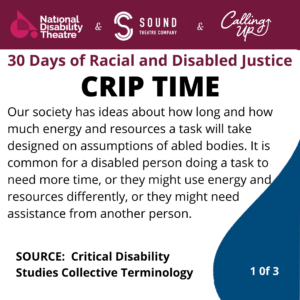CRIP TIME
Our society has ideas about how long and how much energy and resources a task will take designed on assumptions of abled bodies. It is common for a disabled person doing a task to need more time, or they might use energy and resources differently, or they might need assistance from another person.
Disabled/chronically ill and neurodivergent people experience time (and space) differently than able-body/minded folk. In her essay on Crip Time, Ellen Samuels quotes her friends Alison Kafer, who says that crip times means: “rather than bend disabled bodies and minds to meet the clock, crip time bends the clock to meet disabled bodies and minds.”
“One of the gifts of disability and moving on “crip time” — slowly — is that we notice things that people moving quickly typically miss. Another value is that more people are able to remain active for the long haul.”—Leah Lakshmi Piepzna-Samarasinha
Source: Critical Disability Studies Collective Terminology
Image Description: Black text on white background with National Disability Theater, Sound Theater, and Calling Up Justice logos.
FURTHER READING
Reimagining Disability Justice: An Interview with Leah Lakshmi Piepzna-Samarasinha
By Eleanor J. Bader
Critical Disability Studies Collective Terminology
https://cdsc.umn.edu/cds/terms
Six Ways of Looking at Crip Time by Ellen Samuels
https://dsq-sds.org/article/view/5824/4684
When Crip Time Is Chronic
https://www.queerfutures.com/sundaysentiments/2019/12/29/when-crip-time-is-chronic

